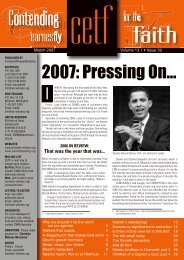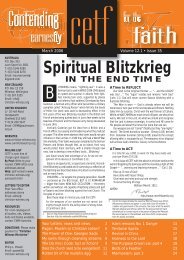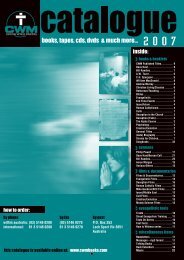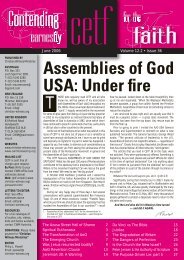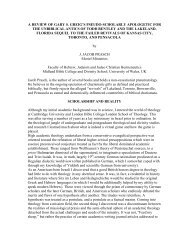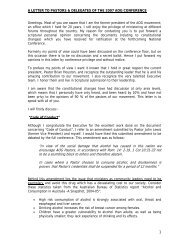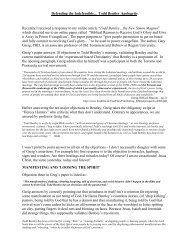Create successful ePaper yourself
Turn your PDF publications into a flip-book with our unique Google optimized e-Paper software.
R O O M F O R P L E A S U R E R O O M F O R B U S I N E S S • B u t f o r C h r i s t t h e c r u c i f i e d6forth fruits in keeping with repentance … Andnow also the axe is laid to the root of the trees:therefore every tree which does not bring forthgood fruit is cut down, and cast into the fire(Matthew 3:2,7,8,10).He should have known that the unchurched dislikesuch authoritative, “holier than thou” styles ofcommunication. Perhaps a trendy church skit or anevangelistic chariot wash would have producedbetter results.While John the Baptist did not lack enthusiasmfor the cause of Christ, the fact that his public ministrylasted only six months ending with his imprisonmentand decapitation illustrates his faulty methodology.Just imagine the harvest that John the Baptistcould have reaped had he softened his messagea bit and been more positive. If he had taken ourapproach, he could have been one of the greatestministers of the gospel in all of church history. Itis true that John the Baptist was commended byChrist, but we cannot help thinking how muchgreater he could have been used if he had not beenso disengaged from the culture and “preachy” inhis ministry. Surely, John the Baptist could learnfrom our example of accommodation, diplomacy,and peaceful coexistence with unchurched mensuch as King Herod.The earthly ministry of our Saviour is notwithout regrettable examples of offensive methods.It is somewhat surprising to us that Jesuschose to emulate the old-style methods of thosewho preceded Him rather than our modern andefficacious style, which He undoubtedly foreknew.The way in which He spoke to the religious leaderscould hardly be considered inclusive or diplomatic.Also, the incident with the moneychangers and thewhip represents inconsistent behaviour from Onewho spoke of being “meek and lowly in heart”.Again, Jesus went so far as to publicly implythat a particular unchurched woman was a dogand not worthy to receive spiritual bread (Matt.15:26). The sixth chapter of John records perhapsthe most tragic event in the earthly ministry of ourSaviour. While trying to inform His hearers aboutobtaining eternal life, Jesus represented the wayas so difficult and narrow that many, many of Hisfollowers turned back “and were not walking withhim any more” (v66). This same narrowness can beseen in the nineteenth chapter of Matthew whenthe rich young ruler inquired of Jesus the way toeternal life and was sent “away sorrowful” by thestringency of Jesus’ words.Given the fact that Jesus ministered in thestyle of Elijah and John the Baptist (Luke 9:18-19), it seems obvious to us why His three yearsof incessant labour produced the rather smallishchurch of 120 souls at the day of Pentecost. Itis certainly commendable that Jesus healed thesick and fed the multitudes. However, we believethat Jesus could have done a great deal more toengender goodwill with His targeted market. Hisministry’s unappealing narrowness was sadlyconspicuous on the day the people cried, “Awaywith this man, and release to us Barabbas”!To the apostle Peter we would like to address thematter of Ananias and Sapphira. Peter should havefound a less confrontational approach to dealingwith this well-intentioned couple. Had they notgiven a sizable portion of their wealth to the workof the ministry? Diplomacy and inclusivity wouldhave proven much more positive than the causticand accusatory language spoken by Peter. The factthat Peter was the human agency of their swiftdemise must have done irrepairable damage to hisreputation as a minister of our longsuffering andgracious heavenly Father. We can only imagine whatharm was done to the spread of the gospel when, toquote from our beloved NIV, “Great fear seized thewhole church and all who heard about these events… No one else dared join them” (Acts 5:11, 13). Weare sure that this regrettable incident with Ananiasand Sapphira kept many compromisers, liars, falseprofessors, hypocrites, and covetous persons outof church fellowship. These are the very people wehave had stupendous success bringing into God’shouse. It is not recorded, but we are sure the Lordmust have been grieved at Peter’s unloving dealingswith this misunderstood couple.There remain numerous examples in the NewTestament of objectionable methods, but timewould fail us to decry them all thoroughly. However,we must mention one other matter from the lifeof the apostle to the unchurched. We find Paul’sdemeanour and attitude toward those outside thechurch to be reprehensible. Please consider someof the scandalous things he wrote:Do not be unequally yoked together with unbelievers:for what fellowship has righteousnesswith unrighteousness? And what communionhas light with darkness? And what concord hasChrist with Belial? Or what part has he that believeswith an infidel? And what agreement hasthe temple of God with idols? … Therefore comeout from among them, and be separate, says theLord, and do not touch the unclean thing; and Iwill welcome you (2 Corinthians 6:14–17).And have no fellowship with the unfruitfulworks of darkness, but rather expose them(Ephesians 5:11).Them that sin rebuke before all, that the othersalso may fear (1 Timothy 5:20).Preach the word; be ready in season, out ofseason; reprove, rebuke, exhort with all longsuffering and instruction. For the time will comewhen they will not endure sound doctrine; butafter their own desires they shall gather forthemselves teachers, having itching ears; Andthey shall turn away their ears from the truth,and shall be turned to myths (2 Timothy 4:2-4).A striking difference between us and Paul theapostle, is his seeming indifference to numericalsuccess. He seemed content to focus his ministryon building a pure bride, even if numerically small.This evidently required that Paul have the battlefieldmindset of a soldier, which is much different thanour own mindset. We dislike the fact that he wasalways fighting and contending. A variety of verbsare used to describe the ministries of Paul andhis associates in the book of Acts. They wereubiquitously found disputing against, reasoningwith, speaking boldly to, preaching to, persuading,exhorting, declaring, and warning their hearers.We believe that this kept them from entering intopeace and rest such as we have. We believe thatby not fighting with the world, we have discoveredthe green pastures and still waters about whichthe Lord spoke in the Psalms. It is not surprisingto us that Paul’s polemical ministry caused him tospend a great deal of time in prison. Perhaps Godwas trying to speak to him there about changinghis methods.We could write for many more pages aboutthe deficiencies of those who ministered beforeAD 1950. Certainly the reformers such as Tyndaleand Luther were wrong in their approach in the1500s. John Bunyan was obviously off track sincehis dogmatism caused him to be locked up in theBedford jail for over a decade in the 1600s. Wecondemn the offensive manner in which the likesof Ge<strong>org</strong>e Whitefield, John Wesley, and scores ofother fanatics preached repentance in the open airto the unchurched in the 1700s. Perhaps the worstexample of such old-style fanaticism was exhibitedby William and Catherine Booth, the founders of theSalvation Army, in the 1800s. It gives us pangs ofnausea when we contemplate the shameful andembarrassing tactics that those here listed used inthe name of our mild-mannered and gentle Jesus.By looking at a description of Whitefield’spreaching, it is plain to see the unchristian tone ofhis sermons. Bishop J.C. Ryle said that Whitefieldwas:... perpetually telling you about your sins,your heart, Jesus Christ, the Holy Ghost, theabsolute need of repentance, faith, holiness…” (<strong>Christian</strong> Leaders of the 18th Century, byJ.C. Ryle, p. 51)Let us look at another example. Note the profusionof negative language in this excerpt from a JohnWesley sermon:Thou ungodly one who hearest these words,thou vile, helpless, miserable sinner, I chargethee before God, the judge of all, go straightunto Jesus with all thy ungodliness … Goas altogether ungodly, guilty, lost, destroyed,deserving and dropping into hell … Plead thousingly the blood of the covenant, the ransompaid for thy proud, stubborn, sinful soul.(<strong>Christian</strong> Leaders of the 18th Century, by J.C.Ryle, p. 93)And what were the effects of these unchristianmethods on the hearers? We could demonstrateour point using numerous examples from the lives ofthe men listed above, but let us look at one accountfrom the journal of Ge<strong>org</strong>e Whitefield:Most were drowned in tears. The Word wassharper than a two-edged sword. The bitter criesand groans were enough to pierce the hardestheart. Some of the people were as pale as death;others were wringing their hands; others lyingon the ground; others sinking into the arms offriends; and most lifting up their eyes to Heavenand crying to God for mercy. (Ge<strong>org</strong>e Whitefield,Vol. 1, by Arnold Dallimore, p. 487)The damage done to the hearers, particularly to anyunchurched people that might have been present,can be clearly seen in Whitefield’s own account.Robbed of their self-esteem, many of Whitefield’shearers were driven into what must have beenmental illness. In fact, a complaint was made toBishop Benson that 15 persons were driven mad byWhitefield’s first sermon, which he preached at hisordination. With such deleterious effects as these,it is no wonder that Luther, Tyndale, Bunyan, Booth,



